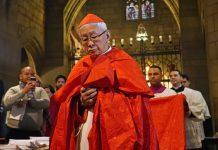The Holy See reaffirms the inviolability of the secrecy of confession and ratifies that absolution cannot be conditioned on future actions in the external forum.

Canberra( September 7, Gaudium Press) — The Australian bishops have provided the federal government with the observations of the Holy See on 12 recommendations of a 2017 report on Child Sexual Abuse.
Some of the recommendations prepared by the Royal Commission on Institutional Responses to Child Sexual Abuse related to the sacrament of confession.
The Holy See reaffirms the inviolability of the secrecy of confession and ratifies that absolution cannot be conditioned on future actions in the external forum while affirms once again “its resolute determination to confront and eradicate the abuse of minors and vulnerable persons, wherever it may occur in the Church.”
The statements of the Holy See are enclosed in a letter dated February 26.
The Holy See’s set of observations were delivered to the Australian Bishops’ Conference, which in turn forwarded them to the Australian Attorney General, and are noted in the Conference’s statement of September 4.
Could absolution be withheld?
The Royal Commission on Institutional Responses to Child Sexual Abuse had advised clarification whether “information received from a child during the sacrament of reconciliation that they have been sexually abused is covered by the seal of confession,” and “if a person confesses during the sacrament of reconciliation to perpetrating child sexual abuse, absolution can and should be withheld until they report themselves to civil authorities.”
The Holy See has responded that June 29, 2019 note of the Apostolic Penitentiary on the internal forum, which had reaffirmed the inviolability of the seal of confession, “provided useful indications for arriving at a considered response to the questions raised.
The Holy See responded that the June 29, 2019 note of the Apostolic Penitentiary on the internal forum, which reaffirmed the inviolability of the seal of confession, “furnished useful indications for arriving at a considered response to the questions raised.”
The Holy See observed that the secret of confession includes all the sins known from the confession, both of the penitent and others, adding that this is “long-standing and constant teaching of the Church on the inviolability of the sacramental seal, as something demanded by the nature of the sacrament itself and thus as deriving from Divine Law.”
The observations added that the confessor “certainly may, and indeed in certain cases should, encourage a victim to seek help outside the confessional or, when appropriate, to report an instance of abuse to the authorities.”
A confessor can withhold absolution only when in doubt about contrition
In matters related to absolution, the Holy See quoted canon law, stating that “the confessor must determine that the faithful who confess their sins are truly sorry for them and that they have a purpose of amendment. Since repentance is, in fact, at the heart of this sacrament, absolution can be withheld only if the confessor concludes that the penitent lacks the necessary contrition. Absolution then, cannot be made conditional on future actions in the external forum.”
It added that “the confessional provides an opportunity- perhaps the only one – for those who have committed sexual abuse to admit to the fact. In that moment the possibility is created for the confessor to counsel and indeed to admonish the penitent, urging him to contrition, amendment of life and the restoration of justice. Were it to become the practice, however, for confessors to denounce those who confessed to child sexual abuse, no such penitent would ever approach the sacrament and a precious opportunity for repentance and reform would be lost.”
The Holy See stressed the importance of adequate formation of confessors to deal with these cases, evolving both victims and abusers.
In November 2019, attorneys general in the federal and state governments of Australia agreed on rules of notification that required priests to break the sacramental seal. Also, priests could not use the defense of privileged communications in the confessional seal to avoid giving testimony against a third party in a criminal or civil trial,
With information from CNA






































